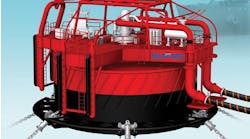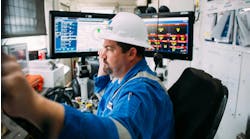LedaFlow consortium investigating CO2 transport and injection
Offshore staff
LYSAKER, Norway — LedaFlow Technologies has formed a research consortium to further develop its multiphase transport simulator technology for transport and injection of CO2.
The CO2Flow project will examine opportunities for safe transport and injection of CO2, with and without impurities, to support carbon capture and storage (CCS). Other members of the consortium are ConocoPhillips, Equinor, ExxonMobil Technology & Engineering, TotalEnergies, Kongsberg Digital, SINTEF Industry, and SINTEF Energy Research.
The aim is to use the results to optimize design and reliable operations of their planned projects.
According to LedaFlow Technologies, accurate simulations should help reduce design margins and the costs of CO2 transport and injection systems while maintaining operational safety.
Precise predictions should also minimize the risk through simulations of various operational scenarios.
Kongsberg Digital will contribute software that can also be deployed on digital twins to operate assets. SINTEF Industry and SINTEF Energy Research will provide access to their resources and information in Norway on multiphase flow modeling and their experimental facilities with CO2 flow capability.
Equinor, TotalEnergies and SINTEF Energy Research have been compiling experimental well data for CO2 injection in the DeFacto flow loop since 2016 and have shared the results with the consortium for model improvement.
The LedaFlow development, initiated in the early 2000s by ConocoPhillips, TotalEnergies and SINTEF, was designed to create a simulator closer to actual physics for oil and gas applications.
A CO2 transport module has been developed since 2017 under TotalEnergies leadership, with support from the CO2FACT JIP (a CLIMIT Demo project).
LedaFlow is constructed using a multi-field approach. It is said to solve the mass equations for all fields, while the energy and momentum conservation equations are solved for each zone, summed over all fields in the zone (continuous phase with the dispersed phases it contains).
This is said to allow for phase change from all fields with the possibility of having both condensation and evaporation simultaneously, supporting accurate simulation of critical transient events such as the rapid phase changes observed in CO2 flow.
The new project has the support of Norway’s CLIMIT program for R&D and demonstration of CCS technology.
01.31.2023



